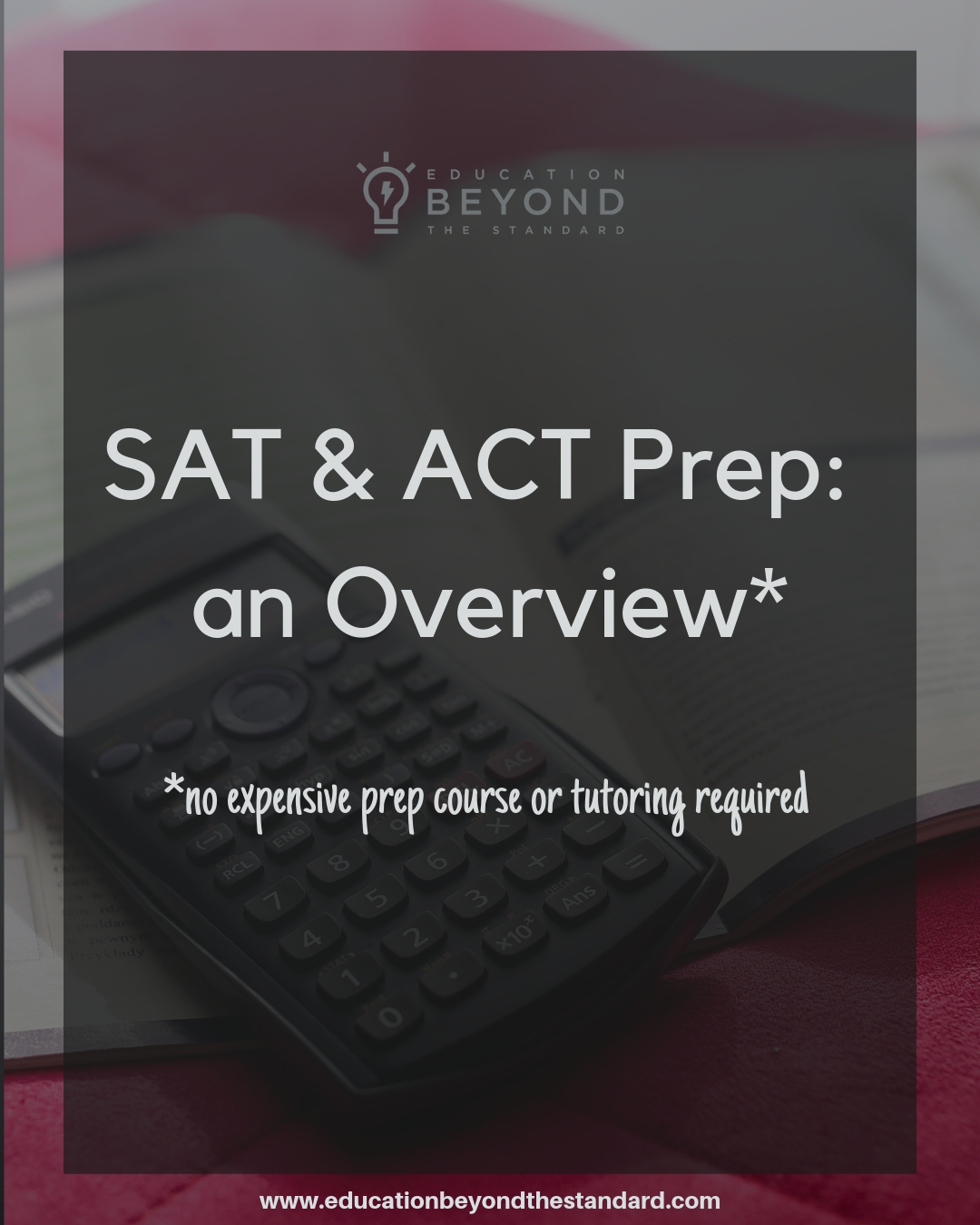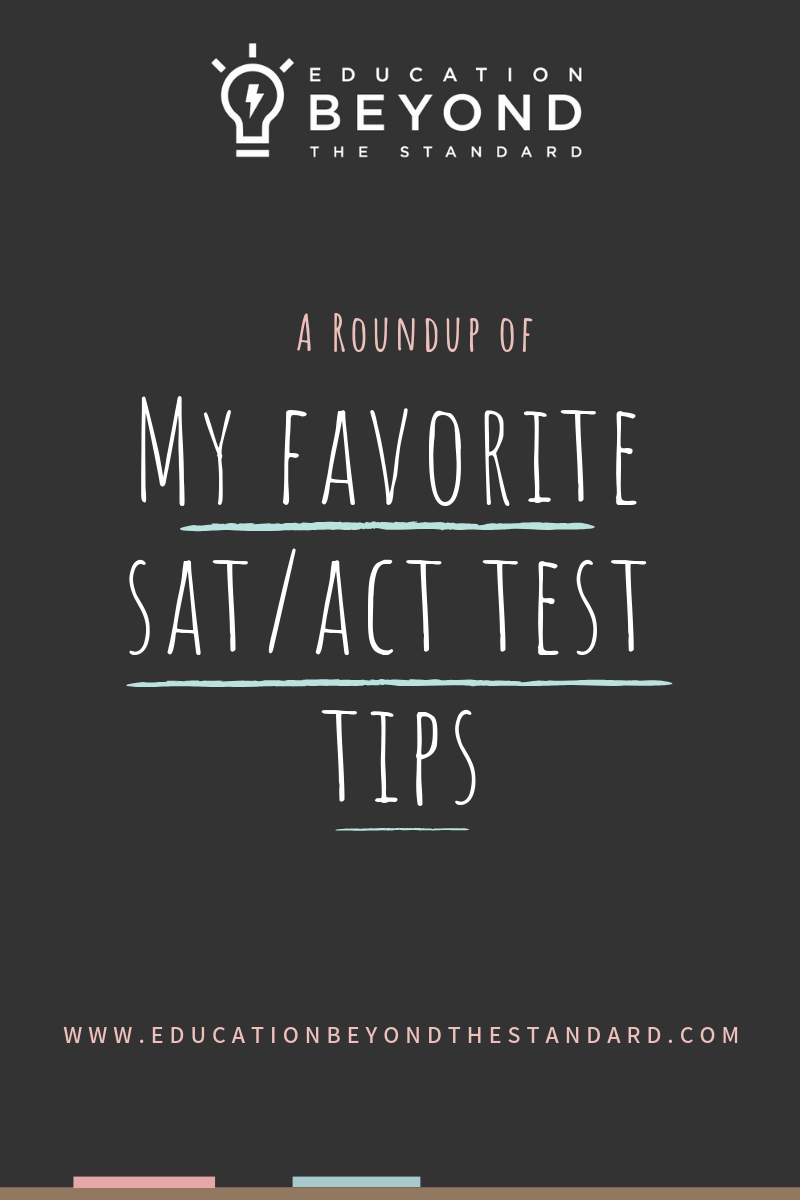SAT and ACT Prep: an Overview
/College Entrance Exams Inspire Mixed (Mostly Negative) Feelings
I have my feelings about high stakes academic testing, and chances are you have yours as well.
On the one hand, the fact that individual students with all of their diverse talents and gifts are subjected to a single test that carries so much weight troubles me. I’ve seen first hand the anxiety that many students experience over their SAT and ACT scores. I’ve also seen the inherent disadvantages that some students face in taking the SAT/ACT.
On the other hand, I recognize that colleges need some “objective” method to both assess students’ readiness for college and compare students who may have almost identical academic records. Whether or not the SAT and ACT effectively meet this purpose is, of course, subject to debate. Studies have shown that students from wealthier and more educated family backgrounds tend to do better on the SAT and ACT than those from less privileged backgrounds. The SAT’s new adversity score attempts to contextualize students’ SAT scores based on their school, neighborhood, and home environments.
But for now, unless we opt out of testing (as some schools have allowed), SAT and ACT scores remain important factors in college admissions decisions. And if students are going to take them, they might as well give themselves the best chance possible of getting a high score.
There are many options for SAT/ACT prep, ranging from almost free and self-directed to pricy online and in-person courses and private tutoring. The good news is that with a solid study plan, some SAT/ACT materials, and consistent practice over a long enough period of time, students can improve their scores significantly without expensive SAT/ACT prep courses or private tutoring.
Content Knowledge vs Academic Skill
The skills tested on the SAT/ACT can be loosely grouped into content knowledge and academic skill.
Content knowledge is the specific material learned by students in a subject area, such as point slope form, special right triangles, and vocabulary.
Academic skill, on the other hand, consists of students’ abilities that apply across various subject areas (e.g., reading speed and accuracy, the ability to analyze a text for structural features, applying content knowledge to solve unique and unfamiliar problems, etc.).
There are some SAT/ACT questions that students could get right based on content knowledge alone. But the majority of questions involve academic skill of some kind, and without that the content knowledge only goes so far.
Content knowledge is relatively fluid. A student who has forgotten the rule for 30-60-90 triangles can relearn that rule pretty quickly. But academic skill is sticky; it takes a long time and a lot of practice to build.
Content may be learned, forgotten, and relearned, but critical reading, writing, and problem solving skills follow students throughout college, higher education and beyond, paving the way for better understanding and better academic performance. A longer view of SAT/ACT prep takes the approach of building these skills over the time necessary for them to become engrained, resulting in higher scores and better preparedness for more advanced studies.
Slow and Steady Wins the Race
So what’s the best way to prepare for the SAT and ACT? Aside from intensive prep courses or private tutoring (which can improve students’ scores in a relatively short period of time, at a high cost), the best SAT/ACT prep approach is an early start with a slow and steady pace to build academic skills like critical reading, writing, and logical problem solving. (Guide to Self-Study for the SAT/ACT)
I recommend that students take the PSAT or PreACT as early as possible and look to fill in any weaknesses as identified by one of these tests. I also recommend that students begin a regular vocabulary building practice as early as 8th or 9th grade, since a broad vocabulary is a major advantage in both the Reading and Writing/Language sections (and of course in college and beyond).
The single best form of preparation for the Reading and Writing/Language sections of the SAT and ACT (and for higher education) is being an avid reader. Students who love to read outside of their assigned school work tend to be more analytical and efficient readers and have better vocabulary, grammar, and writing skills.
The Good News: Self-Study Works
While expensive SAT and ACT prep courses and private tutoring abound, diligent and self motivated students can improve their SAT/ACT scores with just a few affordable materials and a lot of practice spread out over as many months as possible. Check out this guide to self-study for the SAT/ACT for tips on how to prepare for these exams the right way, as well as the following resources for SAT/ACT prep:
Tons of free practice and full length tests for the SAT at Khan Academy
College Board Official SAT Study Guide 2020 Edition or 2018 Edition (Amazon)
Official ACT Prep Pack 2019-2020 Edition or Prep Guide 2019-2020 Edition (Amazon)
There are also many SAT/ACT prep books available from established test prep companies such as Kaplan and Princeton Review. These books recommend specific strategies for approaching different types of test questions.
I’ve also created the following resources that students can use independently for SAT/ACT prep:
Vocabulary for the SAT/ACT with tons of activities for better retention
Homophones and frequently confused words (often tested on the SAT/ACT)
SAT Math Formulas (FREE)



